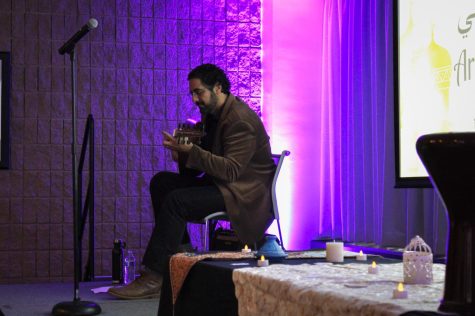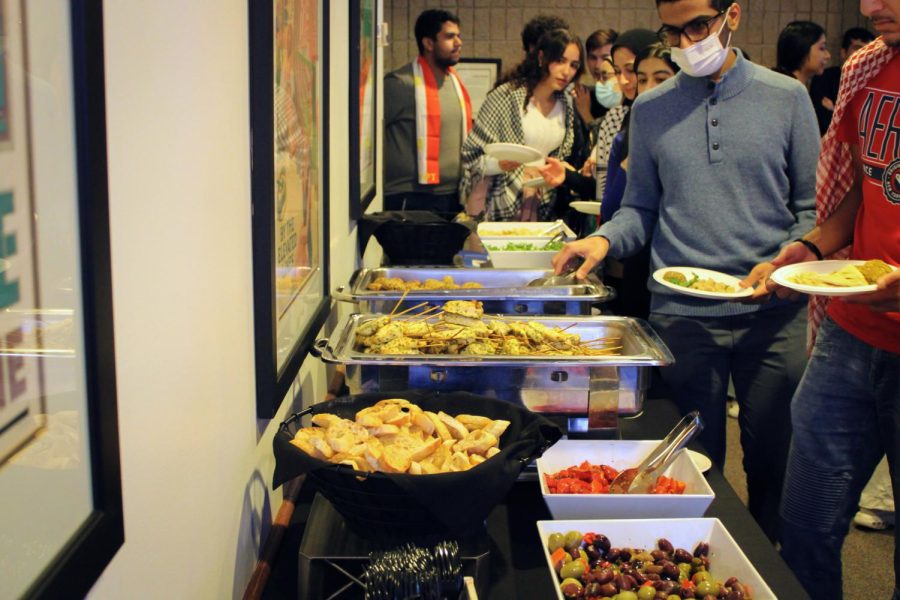Arab Expressions highlights Arabic poetry and music in Arab Heritage Month
Iris Swarthout/Daily Senior Staffer
Arab Expressions provided an opportunity for students to eat traditional cuisine, listen to music and read MENA poetry aloud Monday night.
April 12, 2022
After eating Arab cuisine and listening to musician Ronnie Malley play the oud on stage, Northwestern’s Middle Eastern and North African Student Association shared Arabic-based poems with each other Monday night.
The event, titled Arab Expressions, is the first of its kind, according to Weinberg freshman and MENA Student Association Events Chair Kydie Al Moutaa. However, the group has been hosting Arab heritage events throughout April. Many of these gatherings typically involve dabke, an Arab folk dance, but Al Moutaa said Monday’s poetry night was different.
“As students … we’re always working and we are always super stressed,” she said. “It feels really nice to take some time for ourselves, sit all together, talk about our culture, present it and just read poetry.”

Arab Expressions took place during Ramadan and Arab American Heritage Month, and the poems read aloud represented various aspects of Arab culture. For instance, MENA Student Association President and Weinberg sophomore Sara Ibrahim and McCormick freshman Ziad Elbadry read a poem centered around Tahrir Square, a notable spot for the 2011 Egyptian Revolution.
Other poems read at the event emphasized unity, which Arabic Prof. and MENA Student Association liaison Ragy Mikhaeel said is as much a part of the month as inclusivity toward residents of the 22 Arab countries.
Mikhaeel said “The Visa,” a poem written by Egyptian poet Hisham Al Gakh and read aloud by McCormick senior Abdallah Khawaldeh, represents this sense of Arab unification.
“Most of (the students) who understand the Arabic (of the poem) were clapping,” he said. “We don’t often get united … so through an event like this … we dissolved all the barriers, and we got together in love and respect, and we enjoyed the music.”
Though most of the poems read aloud were in Arabic, some were translated to or read aloud in English. In this way, Mikhaeel said, all students were able to learn more deeply about MENA culture.
He added that even for those who could not understand certain Arabic words, the readers’ cadence and rhythm conveyed meaning.
And according to Arabic Prof. Rana Raddawi, poetry is not an easy art form to perform.
“The person has to have the talent and the passion and … the language to recite the poem, even if it’s not you who wrote (it),” she said. “It requires special skills and … above all, passion.”
Raddawi is a professor of MENA languages and said the language program and the MENA Student Association regularly support each other. For Mikhaeel, Arab culture and language are one and the same.
Al Moutaa said after being unable to take Arabic classes at NU due to testing out of them, reading poetry aloud gave her an opportunity to connect with the language again. She said the event allowed her to embrace her culture.
“I wanted to participate in one way or another to share my cultural heritage in the moment with all the people around me,” she said.
Email: [email protected]
Twitter: @swarthout_iris
Related Stories:
— MENA Student Association builds community in first year on campus
— NU-Qatar professor examines political violence in Lebanon at MENA and Evanston library event












